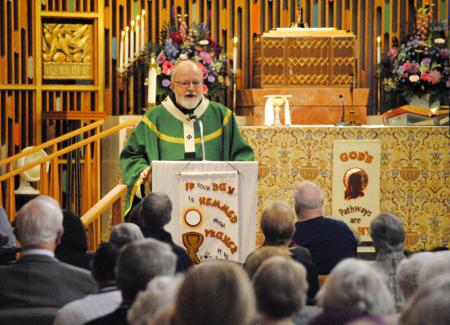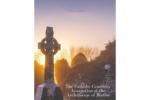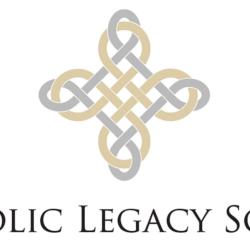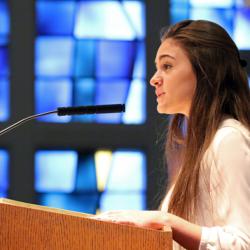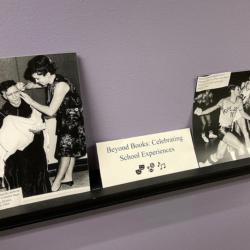Annual Lawn Party celebrates Pope St. John XXIII Seminary's unique mission
WESTON -- People often ask Deacon John Williams if his two combat deployments to Iraq were what inspired him to become a priest. They're right, he tells them, but not in the way they expect.
In February 2003, 20-year-old Deacon Williams dropped out of college and enlisted in the U.S. Marine Corps, one month before the invasion of Iraq.
"I rarely saw a priest in Iraq," he said. "For two years in a row, we went through two entire Lenten seasons with practically no access to the sacraments."
In a single year, he went to Mass five times.
During Holy Week in 2004, his battalion "experienced some of the worst urban combat since the Vietnam War." Three of his fellow Marines died on Easter Sunday morning.
"Yet we could not go to confession on the eve of battle," Deacon Williams recalled. "We could not receive the Eucharist on the holiest day of the year. There was no priest to help us mourn our fallen friends. It was the critical absence of the church during this very vulnerable time in my life that made a profound impression on me."
His division chaplain was a priest in the Archdiocese of Boston -- Father Bill Devine, now pastor of St. Thomas Aquinas Parish in Bridgewater. As chaplain, Father Devine was the only priest in a 53,000-square-mile area. In 2023, Deacon Williams was reintroduced to Father Devine and thanked him for his ministry.
Deacon Williams, a transitional deacon and seminarian at Pope St. John XXIII National Seminary in Weston, told his story at the seminary's 43rd annual Lawn Party on Sept. 25. The party was attended by over 350 people and raised over $400,000 for the seminary, the only seminary in the U.S. that specifically trains men over 30 for the priesthood.
"What I most appreciate about this place, and indeed what I am continually in awe of, is how open to growth the men are here," Deacon Williams said in his remarks. "They are not content to ride off into the sunset. When two roads converged in a wood, they took the one less traveled by."
Deacon Williams said that his fellow seminarians have lived lives full of accomplishment -- founding successful businesses, traveling around the world, rubbing elbows with prominent people, filling powerful positions in government, and raising families. Now, however, their work is mundane. They clean stairwells, iron linens for the seminary chapel, tidy up guest rooms, and clear tables of dirty dishes.
"And they do this because they love God, and they wish to serve the church," Deacon Williams said.
He said that he "wouldn't make it" if he was in a seminary with younger men. He joked that if a lightbulb went out at a seminary full of young men, they would have various reactions. The traditionalist would wonder what the Latin word for "lightbulb" is. The philosopher would ponder the nature of light. The seminarian concerned with social justice would think of those without electricity in third-world countries. The average seminarian at Pope St. John XXIII, however, would simply change the lightbulb.
"And that's why a seminary like this needs to exist," Deacon Williams said. "We need a place where men of our unique personal and professional experience can safely land, feel at home, and embrace our vocations."
Since its founding in 1964 by Cardinal Richard Cushing, Pope St. John has formed men from 150 dioceses and 25 religious orders. Over 750 men formed at the seminary have been ordained as priests. All of the seminary's funding comes from tuition and private donations.
"I can't imagine a more critical mission for the church than the formation of future priests," the seminary's rector, Father Brian R. Kiely, said in his remarks, "because without priests, you will not have the Eucharist. Without the Eucharist, you're not going to live."
Deacon Williams said that he would not be alive if it weren't for a priest. He was the youngest of 15 children -- two brothers and 12 sisters.
"I grew up with two brothers and 13 mothers," he joked.
In 1968, Deacon Williams's father Harvey's first wife died of a brain tumor, leaving him to care for 10 children. The youngest was only two weeks old. Harvey's parish priest, Father Finley, set him up on a blind date with Anne, the woman who would become his second wife and Deacon Williams's mother.
"I'd pay a lot of money to go back in time and hear what my father said that evening," Deacon Williams said. "But whatever he said, it worked, and my mom married him, adopted his 10 children, and bore him five more."
Harvey and Anne were married for 50 years. Though both are now deceased, they have left a legacy through their 123 grandchildren.
"I never met Father Finley, but I am forever grateful for the pastoral care he showed my family," Deacon Williams said. "I would literally not be here if he didn't."
After growing up with 12 sisters, he said, he now has 40 brothers in the form of his fellow seminarians.
During the evening, the seminary presented two men the Pacem in Terris Award, which is given to an "individual who demonstrates generosity, humility, kindness, fidelity, and charity in support of the seminary's mission."
The first recipient was James Mahoney, a Boston-based investor and philanthropist who was a former trustee and development chair at Pope St. John. He led the campaign to build the seminary's new library, which now has over 60,000 volumes in its collection.
"He has assisted us in so many ways," Father Kiely said of Mahoney. "We relied upon his advice, his counsel, his guidance. He has helped us to navigate forward into the future. And I came to believe he is emblematic of what it is to be an instrument of God's peace."
In his remarks, Mahoney called the seminary "a mission that makes sense, that's been around for 60 years, and needed more today than ever before."
"The strong mission, combined with the faculty and staff, the strengths of the people here, makes it easy for me" to be a part of the seminary, he said.
The second Pacem in Terris recipient was Msgr. Francis Kelly, currently a priest in the Diocese of Worcester. He served in the seminary for 13 years, 11 of those as rector. He is also a member of the College of Canons of St. Peter's Basilica.
"We all sense the joy that has come from the great apostolic initiative of Cardinal Cushing," Msgr. Kelly said in his remarks. "And personally, I'm very humbled to be given the Pacem in Terris Award this year."
He said his time at the seminary was "among the most happy and joyful and satisfying years in my 60 years of priesthood."
"I was greatly edified and inspired by the faith and the generosity of the men who came here," he said.
He described the seminarians he shepherded as men who gave up lives of pleasure, ease, and opportunity to serve Christ and his flock.
"I think in those wonderful 13 years, I got more from them than they got from me," he said.
Msgr. Kelly told the current seminarians that the key to their success in priesthood would be daily, prolonged prayer to Jesus.
"You must have a personal friendship with him," he said. "He chose those first seminarians, the 12, to be first disciples of him, then friends with him, and then apostles of him. And you are called to do the same."
